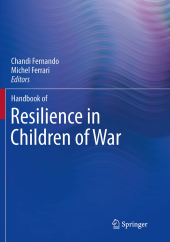 Neuerscheinungen 2016Stand: 2020-02-01 |
Schnellsuche
ISBN/Stichwort/Autor
|
Herderstraße 10
10625 Berlin
Tel.: 030 315 714 16
Fax 030 315 714 14
info@buchspektrum.de |

Chandi Fernando, Michel Ferrari
(Beteiligte)
Handbook of Resilience in Children of War
Herausgegeben von Fernando, Chandi; Ferrari, Michel
Softcover reprint of the original 1st ed. 2013. 2016. xiii, 311 S. 8 SW-Abb. 254 mm
Verlag/Jahr: SPRINGER, BERLIN; SPRINGER NEW YORK; SPRINGER 2016
ISBN: 1-493-93975-0 (1493939750)
Neue ISBN: 978-1-493-93975-6 (9781493939756)
Preis und Lieferzeit: Bitte klicken
This book offers a scientific view of children living in war zones, including research on the psychosocial effects of exposure, narratives of young lives from Afghanistan to Sri Lanka and Colombia to Sudan, current interventions and constructs of resilience.
Their frightened, angry faces are grim reminders of the reach of war. They are millions of children, orphaned, displaced, forced to flee or to fight. And just as they have myriad possibilities for trauma, their lives also hold great potential for recovery.
The Handbook of Resilience in Children of War explores these critical phenomena at the theoretical, research, and treatment levels, beginning with the psychosocial effects of exposure to war. Narratives of young people´s lives in war zones as diverse as Afghanistan, Sri Lanka, Columbia, and Sudan reveal the complexities of their experiences and the meanings they attach to them, providing valuable keys to their rehabilitation. Other chapters identify strengths and limitations of current interventions, and of constructs of resilience as applied to youth affected by war. Throughout this cutting-edge volume, the emphasis is on improving the field through more relevant research and accurate, evidence-based interventions, in such areas as:
An ecological resilience approach to promoting mental health in children of war.
Child soldiers and the myth of the ticking time bomb.
The Child Friendly Spaces postwar intervention program.
The role of education for war-zone immigrant and refugee students.
Political violence, identity, and adjustment in children.
The Handbook of Resilience in Children of War is essential reading for researchers, scientist-practitioners, and graduate students in diverse fields including clinical child, school, and developmental psychology; child and adolescent psychiatry; social work; counseling; education; and allied medical and public health disciplines.
"My friend Emmanuel Jal says he believes he has survived for a reason - to tell his story, to touch lives. It is remarkable how children, the most vulnerable in conflict, are able to transcend the worst evils this world has to offer. The authors of this book recount positive stories of struggles for survival and the remarkable journeys of young people who refused to let their adverse circumstances dictate their future possibilities. This handbook stresses the importance of learning from the past, avoiding cookie-cutter solutions, and, above all, a multidisciplinary approach to caring for our young. It truly takes a village..."
LGen Roméo Dallaire (Ret)
Founder of the Roméo Dallaire Child Soldiers Initiative
--
"Reading Chandi Fernando and Michel Ferrari´s inspiring collection of papers from around the world, it´s clear that there are specific protective processes that help children who are exposed to political violence build and sustain resilience. This is a timely work that sits on the crest of emerging thinking in the field of resilience research. No longer can we explain resilience as something inside a child. It is, as shown in the many studies that are discussed with some of the most disadvantaged children in the world, something we create by making children´s social ecologies safer and more nurturing. This book will be of interest not just to those working with children affected by war, but anyone who works with traumatised young people, whether because of gangs or domestic violence. This volume is one of the first of its kind to show through research and its application to practice that we can help children be more resilient with the right commitments from their families, communities, and most importantly, the policy makers who fund the programs children need."
Michael Ungar, PhD
Co-Director, Resilience Research Centre
Editor, The Social Ecology of Resilience: A Handbook of Theory and Practice


